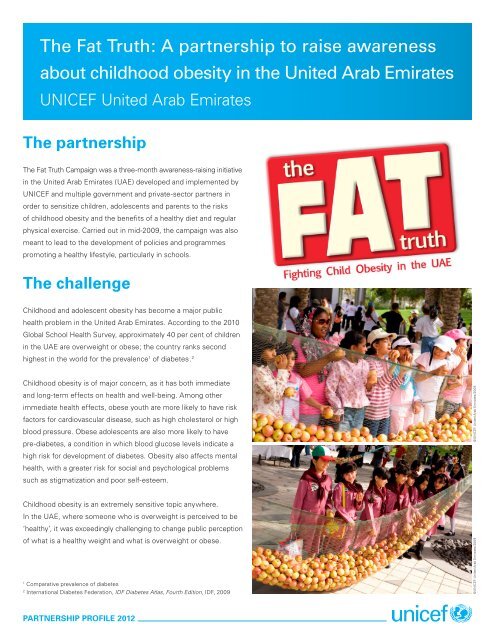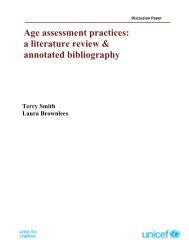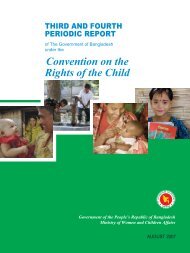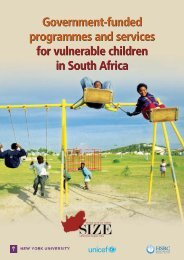The Fat Truth: A partnership to raise awareness about ... - Unicef
The Fat Truth: A partnership to raise awareness about ... - Unicef
The Fat Truth: A partnership to raise awareness about ... - Unicef
You also want an ePaper? Increase the reach of your titles
YUMPU automatically turns print PDFs into web optimized ePapers that Google loves.
<strong>The</strong> <strong>Fat</strong> <strong>Truth</strong>: A <strong>partnership</strong> <strong>to</strong> <strong>raise</strong> <strong>awareness</strong><br />
<strong>about</strong> childhood obesity in the United Arab Emirates<br />
UNICEF United Arab Emirates<br />
<strong>The</strong> <strong>partnership</strong><br />
<strong>The</strong> <strong>Fat</strong> <strong>Truth</strong> Campaign was a three-month <strong>awareness</strong>-raising initiative<br />
in the United Arab Emirates (UAE) developed and implemented by<br />
UNICEF and multiple government and private-sec<strong>to</strong>r partners in<br />
order <strong>to</strong> sensitize children, adolescents and parents <strong>to</strong> the risks<br />
of childhood obesity and the benefits of a healthy diet and regular<br />
physical exercise. Carried out in mid-2009, the campaign was also<br />
meant <strong>to</strong> lead <strong>to</strong> the development of policies and programmes<br />
promoting a healthy lifestyle, particularly in schools.<br />
<strong>The</strong> challenge<br />
Childhood and adolescent obesity has become a major public<br />
health problem in the United Arab Emirates. According <strong>to</strong> the 2010<br />
Global School Health Survey, approximately 40 per cent of children<br />
in the UAE are overweight or obese; the country ranks second<br />
highest in the world for the prevalence 1 of diabetes. 2<br />
Childhood obesity is of major concern, as it has both immediate<br />
and long-term effects on health and well-being. Among other<br />
immediate health effects, obese youth are more likely <strong>to</strong> have risk<br />
fac<strong>to</strong>rs for cardiovascular disease, such as high cholesterol or high<br />
blood pressure. Obese adolescents are also more likely <strong>to</strong> have<br />
pre-diabetes, a condition in which blood glucose levels indicate a<br />
high risk for development of diabetes. Obesity also affects mental<br />
health, with a greater risk for social and psychological problems<br />
such as stigmatization and poor self-esteem.<br />
Childhood obesity is an extremely sensitive <strong>to</strong>pic anywhere.<br />
In the UAE, where someone who is overweight is perceived <strong>to</strong> be<br />
‘healthy’, it was exceedingly challenging <strong>to</strong> change public perception<br />
of what is a healthy weight and what is overweight or obese.<br />
1<br />
Comparative prevalence of diabetes<br />
2<br />
International Diabetes Federation, IDF Diabetes Atlas, Fourth Edition, IDF, 2009<br />
©UNICEF United Arab Emirates/2009 ©UNICEF United Arab Emirates/2009<br />
PARTNERSHIP PROFILE 2012
Background<br />
As part of the implementation of the UAE’s strategic plan <strong>to</strong> combat obesity, UNICEF initiated<br />
a national <strong>awareness</strong> campaign <strong>to</strong> bring the issue of childhood obesity <strong>to</strong> the forefront of<br />
social concern, influence political dialogue, spur collective action and result in changes<br />
in individual behaviour. <strong>The</strong> initiative was developed by UNICEF in <strong>partnership</strong> with the<br />
Ministry of Health (MoH), with the support of the Ministry of Education (MoE), and under<br />
the patronage of HRH Princess Haya Bint Al Hussein, wife of HH Sheikh Mohammed Bin<br />
Rashid Al Mak<strong>to</strong>um, Vice President and Prime Minister of the UAE and Ruler of Dubai.<br />
During the development phase of the campaign, UNICEF approached<br />
a wide range of public and private partners <strong>to</strong> enlist their support for<br />
the initiative. Along with the World Health Organization and the main<br />
government partners, other local government and semi-government<br />
partners were involved, including the General Women’s Union; the<br />
Princess Haya Initiative for the Development of Health, Physical<br />
Education and School Sports; and the Government of Dubai’s<br />
Knowledge and Human Development Authority. In addition,<br />
support was obtained from several private companies, including<br />
Virgin Megas<strong>to</strong>res, Fitness First, Right Bite, My Gym, and InMotion.<br />
Activities<br />
Launched on 20 April 2009 under the umbrella slogan ’Get Involved<br />
So <strong>The</strong>y Can Too’, the <strong>Fat</strong> <strong>Truth</strong> Campaign consisted of a series of<br />
joint school and community events and communications activities<br />
(creation and dissemination of TV and radio spots, newspaper<br />
and magazine ads, posters, leaflets and so on) organized with<br />
the partners and carried out over a period of three months.<br />
<strong>The</strong>se events and activities aimed at reaching a wide audience,<br />
particularly children, adolescents and parents, showing the risks<br />
of future illness linked <strong>to</strong> childhood obesity and the benefits of a<br />
healthy diet and physical activity.<br />
In terms of <strong>awareness</strong> raising, the partners endeavoured <strong>to</strong> reach<br />
a wide segment of the UAE community by using a combination of<br />
communications media involving a number of public and private<br />
sec<strong>to</strong>rs. Key activities undertaken by partners included school<br />
seminars <strong>to</strong> <strong>raise</strong> <strong>awareness</strong> on childhood obesity and various<br />
community events including community days in public parks – for<br />
example, the Community Sports Day – that involved physical<br />
activity and competitions for students, their parents and school staff.<br />
Similarly, corporate partners organized physical fitness sessions in<br />
schools and during the community events and distributed healthy<br />
food and beverages during these events.<br />
©UNICEF United Arab Emirates/2009<br />
PARTNERSHIP PROFILE 2012
It should be noted that, given the sensitivity surrounding the <strong>to</strong>pic<br />
of obesity in the UAE, all communications materials had <strong>to</strong> be<br />
designed in a culturally appropriate manner so that, especially in<br />
schools, they would not offend the children or their families.<br />
Mass media partners contributed by providing coverage of campaign<br />
events, by incorporating obesity content in their regular programming<br />
and by disseminating special campaign-related messages in radio<br />
and television shows and magazine articles providing educational<br />
and useful tips <strong>about</strong> healthy lifestyles. Furthermore, information<br />
booths in shopping malls, posters in s<strong>to</strong>res, a cookbook, a comic<br />
book, a dedicated website and a variety of leaflets all carried healthy<br />
eating messages as part of the campaign.<br />
UNICEF, in collaboration with the Ministries of Health and Education,<br />
also organized workshops with health, education, corporate and<br />
media partners <strong>to</strong> provide recommendations for policymakers<br />
regarding proper nutrition and physical activity.<br />
©UNICEF United Arab Emirates/2009<br />
Results<br />
By utilizing a variety of means of communication, the <strong>Fat</strong> <strong>Truth</strong><br />
Campaign reached a large number of children and parents living in the<br />
United Arab Emirates, including both UAE nationals and expatriates.<br />
As though <strong>to</strong> demonstrate its success as well as its impact in the<br />
political sphere, the campaign was selected <strong>to</strong> receive the Best<br />
Health Project award by the Gulf Cooperation Council for Health<br />
Ministers in 2010.<br />
Following the campaign, policymakers have implemented new<br />
strategies <strong>to</strong> address health issues in school. In September<br />
2010, the Ministry of Education passed a law banning the sale of<br />
unhealthy items such as chocolate and high-sugar drinks in school<br />
canteens. New health policies have also been developed requiring<br />
schools <strong>to</strong> shift focus from ‘education only’ <strong>to</strong> include health<br />
promotion as well. Health education sessions are now a manda<strong>to</strong>ry<br />
part of the new school curriculum.<br />
Further, the Ministry of Health has developed the School Health<br />
Committee, a group consisting of representatives from various<br />
government and non-government entities whose role is <strong>to</strong> meet<br />
regularly <strong>to</strong> discuss the status of health in schools and make<br />
recommendations for adjustment.<br />
©UNICEF United Arab Emirates/2009
Lessons learned and<br />
way forward<br />
In 2009, the global financial crisis particularly affected UNICEF<br />
programmes in the UAE. However, by working closely and in an<br />
innovative way with various private-sec<strong>to</strong>r partners, UNICEF was<br />
able <strong>to</strong> successfully leverage the available resources <strong>to</strong> achieve<br />
the programme results.<br />
Each of the <strong>Fat</strong> <strong>Truth</strong> Campaign partners contributed expertise,<br />
services and products <strong>to</strong> the effort. Moreover, given the in-kind<br />
support and donations received from the companies involved,<br />
costs related <strong>to</strong> the implementation of the campaign were significantly<br />
reduced, by approximately US$1.4 million.<br />
In turn, the campaign gave its private-sec<strong>to</strong>r partners high visibility,<br />
which was a real incentive for a company eager <strong>to</strong> have its contributions<br />
<strong>to</strong> global humanitarian efforts recognized by the United Nations.<br />
Building on the success of the 2009 campaign, UNICEF and its<br />
partners developed a follow-up, the Childhood Obesity Prevention<br />
Project. This one-year project was implemented in eight schools in<br />
the UAE during the 2011–2012 academic year with the objective of<br />
teaching students, school staff and parents how <strong>to</strong> adopt a healthy<br />
lifestyle.<br />
<strong>The</strong> project includes health and physical education, nutrition services<br />
and psychological and social services. By providing a safe and<br />
supportive environment that encourages healthy behaviours, schools<br />
play a critical role in achieving the project’s goals. <strong>The</strong>y also provide<br />
opportunities for students not only <strong>to</strong> learn <strong>about</strong> healthy eating and<br />
physical fitness but also <strong>to</strong> put their new behaviours in<strong>to</strong> practice.<br />
©UNICEF United Arab Emirates/2009<br />
PARTNERSHIP PROFILE 2012

















